A Hungarian software development company Coding Sans has just released Startup Edition of their State of Software Development Report 2017 and I'd like to share with you some of its most interesting and unexpected highlights in case you've missed it.
Coding Sans surveyed 126 techies working at startups across different verticals including IT consulting and managed services, marketing and advertising, FinTech, healthcare, and many more. Of all respondents, over 55% were from Europe and 8% represented North America. Prevailing majority of companies polled (44%) admitted having 1-5 people on their software development teams, while less than 5% said they had over 41 team members (see details below).
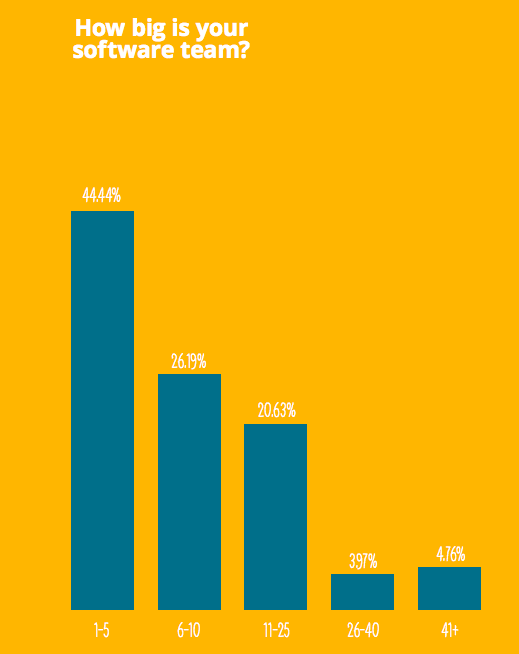
Image courtesy of codingsans.com
Speaking about the most critical challenges faced by startups today and how they manage to solve them, the situation looks as follows.
Top 3 challenges are: hiring talent (35.4%), prioritizing development (25%) and capacity issues (nearly 14%).
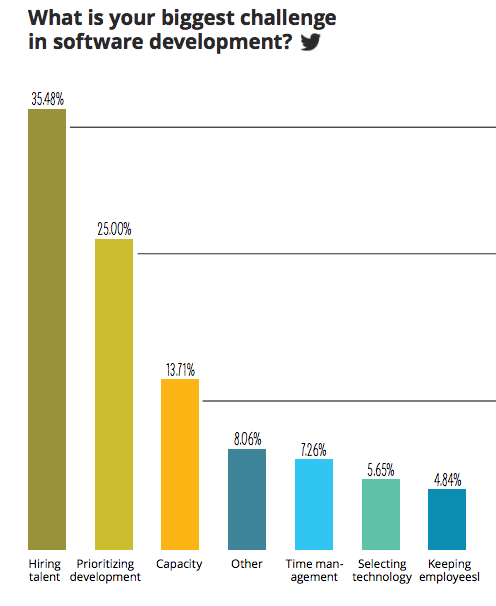
Image courtesy of codingsans.com
- In order to overcome talent hiring issues, most of startups "hire a head hunter or agency and also try to use professional connections to get talent on board". Another way to solve this issue is to "allocate more time for hiring and posting job offers on job websites".
- In order to handle development prioritization challenges, the vast majority of startups a) collect feedback from potential users and existing customers by doing interviews and conducting surveys, b) hire a dedicated PM / tech lead and spend more time on product management, and c) initiate and hold regular team meetings (daily stand-ups, retrospectives, etc).
- In order to overcome capacity issues, many startups "keep their product development more focused, only paying attention to things that are aligned with business goals", hire more people, and outsource their development overseas or onshore.
When it comes to software development methodologies, top 3 most popular ones are Scrum (56%), Kanban (35%), Lean development (20%). Nearly 13% of the survey participants confessed they didn't use Agile methodology at all.
Asked about primary programming language(s) used for their project development, respondents outlined the following as the primary ones:
- JavaScript (52%)
- Java (36.5%)
- Python (32.5%)
- PHP (22%)
- Swift (22%)
C and Go turn out to be the least popular / used languages: 8.7% and 3% accordingly.
Asked about what new programming languages they consider using in the next 12 months, respondents provided the following answers:
- JavaScript (15%)
- Python (11.9%)
- TypeScript (11.9%)
- Go (11.9)
Almost 43% admitted they weren't going to use any new programming languages in the months to come.
According to the report, top 4 development priorities for startups in 2017 are:
- Building new features (45%)
- Scaling product (19%)
- Releasing MVP (17%)
- Improving performance (9%)
On average, 23.5% of software development teams work remotely.
Further, almost 29% of IT specialists surveyed say they don't need any software testing tools yet. That's an alarming finding to me, as it proves that product quality isn't the #1 priority for many startups, which it should be. However, this finding may also be attributed to the fact that many startups, especially non technology ones, don't develop products internally and rely on their 3rd party providers to do quality assurance.
Top 3 factors that prevent startups from using tools to improve / optimize development processes are:
- Time to deploy and use (26%)
- Time to research (16%)
- Budget / cost issues (13%)
Good news is that 94% of survey participants said their companies used PM tools. Top 5 specified tools are:
- Jira (37%)
- Trello (21%)
- Asana (12%)
- GitHub (8%)
- Google Sheets (4%)
Thirty percent of startups use tools not specified in the survey!
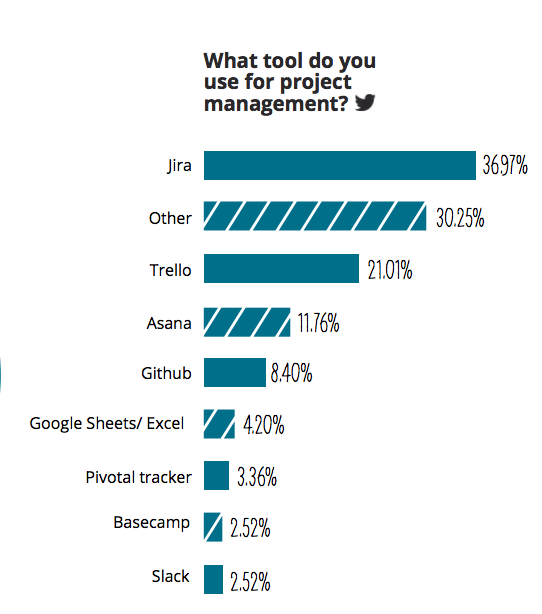
Image courtesy of codingsans.com
Further, almost 93% of participants admitted using version control systems.
Git is an indisputable leader used by over 91% of all startups polled.
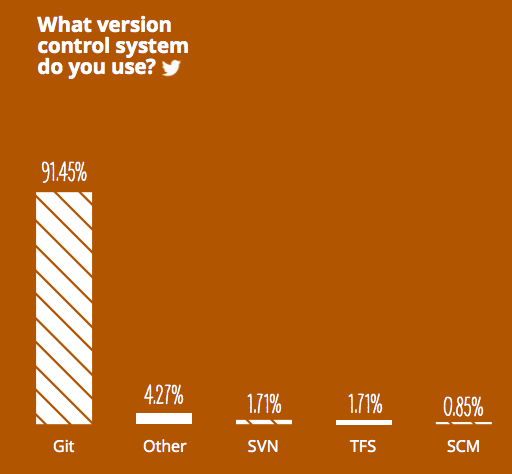
Image courtesy of codingsans.com
Top 3 team communication tools are as follows:
- Slack (86%)
- Email (67%)
- Google hangouts (38%)
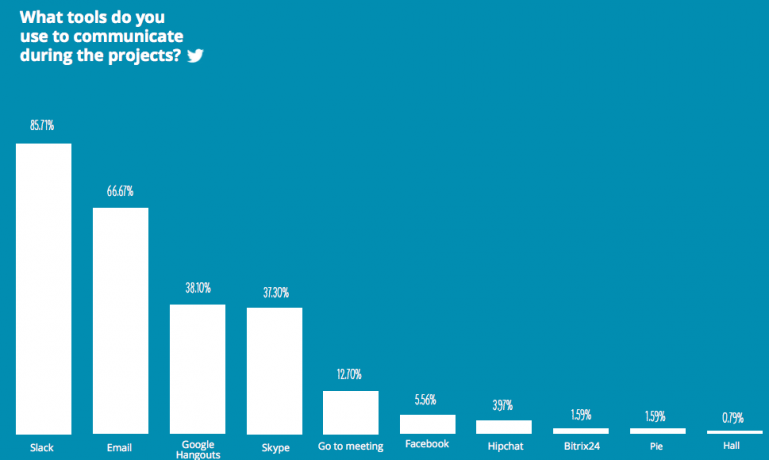
Image courtesy of codingsans.com
Asked about their most effective IT talent hiring methods, survey participants provided the following answers:
- Employee referrals (35%)
- Professional connections (30%)
- Recruitment agency or headhunter (13%)
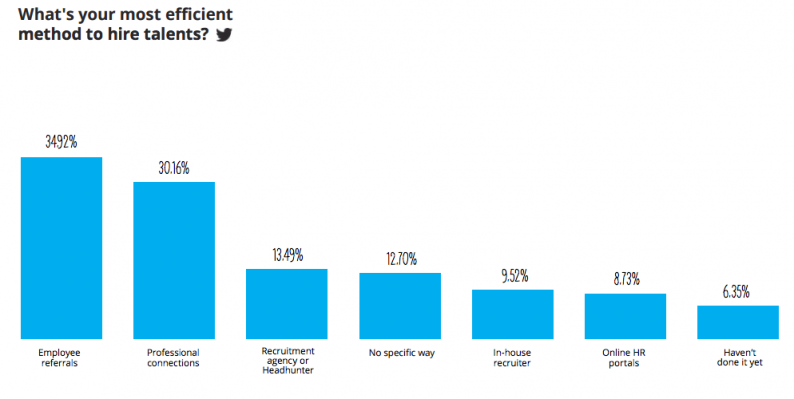
Image courtesy of codingsans.com
On average, it takes startups 7.34 weeks to hire a software engineer! The median is 6 weeks.
According to the Report by Coding Sans, top 3 hiring criteria are:
- Work experience (68.5%)
- Cultural fit (60%)
- Test project (31.5%)
Challenging job, team culture and flexible working hours are the top incentives startups use to attract talents (see details below).
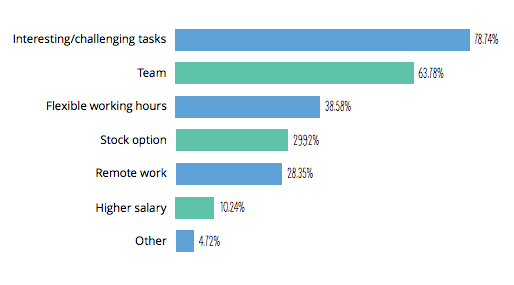
Image courtesy of codingsans.com
Asked about whether or not they have ever outsourced part of / entire software development to a 3rd party vendor / freelancer, survey participants provided the following answers:
- 56.3% of startups already worked with an external contractor (freelancer, software development company)
- 43.7% haven’t outsourced software development to anybody
- 14.5% are planning to do it in the next 12 months
It's interesting to note that 40% of those that plan to outsource during 2017 will use a professional software development company.
48% of startups are satisfied with their software outsourcing results!
That's pretty much it. For more research details, please download the Report from the Coding Sans website or contact Report's author Tamas Torok on LinkedIn.

